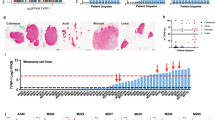Abstract
MART-1 (melanoma antigen recognized by T cells) is also known as Melan-A. It has gained wide acceptance as an immunohistochemical marker to diagnose melanoma in biopsy material. MART-1 is not expressed in tissues lacking melanin pigment. Cellular and humoral immune responses against MART-1 have been detected in patients with melanoma and substantial efforts are ongoing to develop MART-1 as a therapeutic target in conjunction with T-cell checkpoint antibodies, cellular immunotherapy and peptide vaccines using a variety of adjuvants.
Similar content being viewed by others
References
Cole DJ, Weil DP, Shamamian P, et al. Identification of MART-1-specific T-cell receptors: T cells utilizing distinct receptor variable and joining regions recognize the same tumor epitope. Cancer Res. 1994;54:5265–8.
Kawakami Y, Eliyahu S, Delgado CH, et al. Cloning of the gene coding for a shared human melanoma antigen recognized by autologous T cells infiltrating into tumor. Proc Natl Acad Sci. 1994a;91:3515–9.
Kawakami Y, Eliyahu S, Sakaguchi K, et al. Identification of the immunodominant peptides of the MART-1 human melanoma antigen recognized by the majority of HLA-A2-restricted tumor infiltrating lymphocytes. J Exp Med. 1994b;180:347–52.
Klein O, Nicholaou T, Browning J, et al. Melan-A-specific cytotoxic T cells are associated with tumor regression and autoimmunity following treatment with anti-CTLA-4. Clin Cancer Res. 2009;15:2507–13.
Li Y, Liu S, Hernandez J, et al. MART-1-specific melanoma tumor-infiltrating lymphocytes maintaining CD28 expression have improved survival and expansion capability following antigenic restimulation in vitro. J Immunol. 2009;184:452–65.
Palucka AK, Ueno H, Connolly J, et al. Dendritic cells loaded with killed allogenic melanoma cells can induce objective clinical responses and MART-1 specific CD8+ T-cell immunity. J Immunother. 2006;29:545–57.
Ribas A, Comin-Anduix B, Chmielowski B, et al. Dendritic cell vaccination combined with CTLA4 blockade in patients with metastatic melanoma. Clin Cancer Res. 2009;15:6267–76.
Romero P, Valmori D, Pittet MJ, et al. Antigenicity and immunogenicity of melan-A/MART-1 derived peptides as targets for tumor reactive CTL in human melanoma. Immunol Rev. 2002;188:81–96.
Author information
Authors and Affiliations
Corresponding author
Editor information
Editors and Affiliations
Rights and permissions
Copyright information
© 2013 Springer Science+Business Media New York
About this entry
Cite this entry
Curti, B.D. (2013). MART-1. In: Marshall, J. (eds) Cancer Therapeutic Targets. Springer, New York, NY. https://doi.org/10.1007/978-1-4614-6613-0_50-6
Download citation
DOI: https://doi.org/10.1007/978-1-4614-6613-0_50-6
Received:
Accepted:
Published:
Publisher Name: Springer, New York, NY
Online ISBN: 978-1-4614-6613-0
eBook Packages: Springer Reference Biomedicine and Life SciencesReference Module Biomedical and Life Sciences




